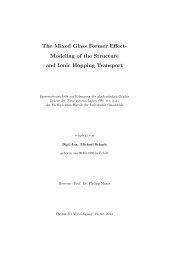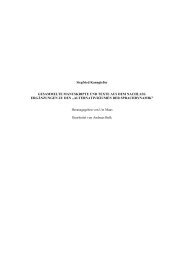352 Literatur MARWAHA, S. & JOHNSON, S. (2004). Schizophrenia and employment: A review. Social Psychiatry and Psychiatric Epidemiology, 39(5), 337-349. MAß, R. (2001). ESI. Eppendorfer Schizophrenie-Inventar. Manual. Göttingen: Hogrefe. Maß, R. (2003). Charakteristische Selbstwahrnehmungen kognitiver Dysfunktionen Schizophrener. Aachen: Shaker. MAß, R., HAASEN, C. & WOLF, K. (2000). Das Eppendorfer Schizophrenie-Inventar (ESI). Entwicklung <strong>und</strong> Evaluation eines Fragebogens zur Erfassung charakteristischer Selbstwahrnehmungen kognitiver Dysfunktionen schizophren Erkrankter. Nervenarzt, 71(11), 885-892. MAß, R., SCHOEMIG, T., HITSCHFELD, K., WALL, E. & HAASEN, C. (2000). Psychopathological syndromes of schizophrenia: Evaluation of the dimensional structure of the Positive and Negative Syndrome Scale. Schizophrenia Bulletin, 26(1), 167-177. MASUDA, M. & HOLMES, T. H. (1978). Life events: Perceptions and frequencies. Psychosomatic Medicine, 40(3), 236-261. MATTES, R., COHEN, R., BERG, P., CANAVAN, A. G. & HOPMANN, G. (1991). Slow cortical potentials (SCPs) in schizophrenic patients during performance of the Wisconsin card-sorting test (WCST). Neuropsychologia, 29(2), 195-205. MAYER-GROSS, W. (1920). Über die Stellungnahme zur abgelaufenen akuten Psychose. Eine Studie über verständliche Zusammenhänge in der Schizophrenie. Zeitschrift für die gesamte Neurologie <strong>und</strong> Psychiatrie, 60, 160-212. MAZEH, D., BODNER, E., WEIZMAN, R., CHOLOSTOY, A., BARAK, Y., MARTIN, T. & DELAYAHU, Y. (2009). Co-morbid social phobia in schizophrenia. International Journal of Social Psychiatry, 55(3), 198-202. MCCABE, R. & PRIEBE, S. (2004). Explanatory models of illness in schizophrenia: Comparison of four ethnic groups. British Journal of Psychiatry, 185(1), 25-30. MCCABE, R. & QUAYLE, E. (2002). Knowing your own mind. The Psychologist, 15(1), 14-16. MCCABE, R., QUAYLE, E., BEIRNE, A. D. & DUANE, M. M. A. (2000). Is there a role for compliance in the assessment of insight in chronic schizophrenia? Psychology, Health & Medicine, 5(2), 173-178. MCCABE, R., QUAYLE, E., BEIRNE, A. D. & DUANE, M. M. A. (2002). Insight, global neuropsychological functioning and symptomatology in chronic schizophrenia. Journal of Nervous and Mental Disease, 190(8), 519-525. MCCAFFREY, R. J., DUFF, K. & WESTERVELT, H. J. (2000). Practitioner's guide to evaluating change with neuropsychological assessment instruments. Dordrecht, Niederlande: Kluwer Academic Publishers. MCCAY, E. A. & SEEMAN, M. V. (1998). A scale to measure the impact of a schizophrenic illness on an individual's selfconcept. Archives of Psychiatric Nursing, 12(1), 41-49. MCCLELLAND, D. C., KOESTNER, R. & WEINBERGER, J. (1989). How do self-attributed and implicit motives differ? Psychological Review, 96(4), 690-702. MCCLELLAND, G. H. & JUDD, C. M. (1993). Statistical difficulties of detecting interactions and moderator effects. Psychological Bulletin, 114(2), 376-390. MCDONALD, E.M., PICA, S. & MCDONALD, S. (1998). Stress and coping in early psychosis: Role of symptoms, self-efficacy, and social support in coping with stress. British Journal of Psychiatry, 172(33), 122-127. MCDONALD-SCOTT, P., MACHIZAWA, S. & SATOH, H. (1992). Diagnostic disclosure: A tale in two cultures. Psychological Medicine, 22(1), 147-157. MCEVOY, J. P., APPERSON, L. J., APPELBAUM, P. S., ORTLIP, P., BRECOSKY, J., HAMMILL, K., GELLER, J. L. & ROTH, L. (1989). Insight in schizophrenia: Its relationship to acute psychopathology. Journal of Nervous and Mental Disease, 177(1), 43-47. MCEVOY, J. P., HARTMAN, M., GOTTLIEB, D., GODWIN, S., APPERSON, L. J. & WILSON, W. (1996). Common sense, insight, and neuropsychological test performance in schizophrenia patients. Schizophrenia Bulletin, 22(4), 635-641. MCEVOY, J. P., JOHNSON, J., PERKINS, D., LIEBERMAN, J. A., HAMER, R. M., KEEFE, R. S. E., TOHEN, M., GLICK, I. D. & SHARMA, T. (2006). Insight in first-episode psychosis. Psychological Medicine, 36(10), 1385-1393. MCEVOY, J. P., SCHOOLER, N. R., FRIEDMAN, E., STEINGARD, S. & ALLEN, M. (1993). Use of psychopathology vignettes by patients with schizophrenia or schizoaffective disorder and by mental health professionals to judge patients' insight. American Journal of Psychiatry, 150(11), 1649-1653. MCGHIE, A. & CHAPMAN, J. (1961). Disorders of attention and perception in early schizophrenia. British Journal of Medical Psychology, 34, 103-116. MCGLASHAN, T. H. (1987). Recovery style from mental illness and long-term outcome. Journal of Nervous and Mental Disease, 175(11), 681-685. MCGLASHAN, T. H., LEVY, S. T. & CARPENTER, W. T. (1975). Integration and sealing over. Archives of General Psychiatry, 32(10), 1269-1272. MCGLASHAN, T. H., WADESON, H. S., CARPENTER, W. T. & LEVY, S. T. (1977). Art and recovery style from psychosis. Journal of Nervous and Mental Disease, 164(3), 182-190. MCGLINCHEY, J. B., ATKINS, D. C. & JACOBSON, N. S. (2002). Clinical significance methods: Which one to use and how useful are they? Behavior Therapy, 33(4), 529-550. MCGLINCHEY, J. B., ATKINS, D. C. & JACOBSON, N. S. (2003). 'Clinical significance methods: Which one to use and how useful are they?': Erratum. Behavior Therapy, 34(1), 127. MCGLYNN, S. M. & SCHACTER, D. L. (1989). Unawareness of deficits in neuropsychological syndromes. Journal of Clinical and Experimental Neuropsychology, 11(2), 143-205. MCGLYNN, S. M. & SCHACTER, D. L. (1997). The neuropsychology of insight: Impaired awareness of deficits in a psychiatric context. Psychiatric Annals, 27(12), 806-811.
353 Literatur MCGUIGAN, F. J. (1974). Amount learned: An empirical basis for grading teachers and students. Teaching of Psychology, 1(1), 10-15. MCGURK, S. R., COLEMAN, T., HARVEY, P. D., REICHENBERG, A., WHITE, L., FRIEDMAN, J., PARRELLA, M. & DAVIS, K. L. (2004). Working Memory Performance in Poor Outcome Schizophrenia: Relationship to Age and Executive Functioning. Journal of Clinical and Experimental Neuropsychology, 26(2), 153-160. MCGURK, S. R., TWAMLEY, E. W., SITZER, D. I., MUESER, K. T. & MCHUGO, G. J. (2007). A meta-analysis of cognitive remediation in schizophrenia. American Journal of Psychiatry, 164(12), 1791-1802. MCKAY, D., NEZIROGLU, F., TODARO, J. & YARYURA-TOBIAS, J. A. (1996). Changes in personality disorders following behavior therapy for obsessive-compulsive disorder. Journal of Anxiety Disorders, 10(1), 47-57. MCKENNA, M. C., ZEVON, M. A., CORN, B. & ROUNDS, J. (1999). Psychosocial factors and the development of breast cancer: A meta-analysis. Health Psychology, 18(5), 520-531. MCLEOD, H. J., COERTZE, L. & MOORE, E. (2009). The relationship between insight and social rank appraisals in people with schizophrenia. British Journal of Clinical Psychology, 48(3), 329-334. MCPHERSON, F. M., PRESLY, A. S., ARMSTRONG, J. & CURTIS, R. H. (1974). 'Psychoticism' and psychotic illness. British Journal of Psychiatry, 125(585), 152-160. MCSWEENY, A. J., NAUGLE, R. I., CHELUNE, G. J. & LÜDERS, H. (1993). 'T Scores for Change': An illustration of a regression approach to depicting change in clinical neuropsychology. Clinical Neuropsychologist, 7(3), 300-312. MECHANIC, D. (1991). Some modes of adaptation: Defense. In A. MONAT & R. S. LAZARUS (Hrsg.), Stress and coping: An anthology (3. Aufl.) (S. 337-351). New York: Columbia University Press. MECHANIC, D., MCALPINE, D., ROSENFIELD, S. & DAVIS, D. (1994). Effects of illness attribution and depression on the quality of life among persons with serious mental illness. Social Science & Medicine, 39(2), 155-164. MEDALIA, A. & THYSEN, J. (2008). Insight into neurocognitive dysfunction in schizophrenia. Schizophrenia Bulletin, 34(6), 1221-1230. MENNINGER, K. A. (1954). Psychological aspects of the organism <strong>und</strong>er stress. Part I: The homeostatic regulatory function of the ego. Journal of the American Psychoanalytic Association, 2, 67-106. MESHOLAM-GATELY, R. I., GIULIANO, A. J., GOFF, K. P., FARAONE, S. V. & SEIDMAN, L. J. (2009). Neurocognition in firstepisode schizophrenia: A meta-analytic review. Neuropsychology, 23(3), 315-336. METZ, J. T., JOHNSON, M. D., PLISKIN, N. H. & LUCHINS, D. J. (1994). Maintenance of training effects on the Wisconsin Card Sorting Test by patients with schizophrenia or affective disorders. American Journal of Psychiatry, 151(1), 120-122. MILLER, B. L. & CUMMINGS, J. L. (1999). (Hrsg.). The human frontal lobes. Functions and disorders. New York: Guilford. MILLER, P. H. (2002). Theories of developmental psychology (4. Aufl.). New York: Worth. MILLER, R. & MASON, S. E. (2005). Shame and guilt in first-episode schizophrenia and schizoaffective disorders. Journal of Contemporary Psychotherapy, 35(2), 211-221. MILLER, S. M. (1987). Monitoring and blunting: Validation of a questionnaire to assess styles of information seeking <strong>und</strong>er threat. Journal of Personality and Social Psychology, 52(2), 345-353. MILLER, S. M. (1989). Cognitive informational styles in the process of coping with threat and frustration. Advances in Behaviour Research & Therapy, 11(4), 223-234. MILLER, S. M., RODOLETZ, M., SCHROEDER, C. M., MANGAN, C. E. & SEDLACEK, T. V. (1996). Applications of the monitoring process model to coping with severe long-term medical threats. Health Psychology, 15(3), 216-225. MILNER, B. (1963). Effect of different brain lesions on card sorting. The role of the frontal lobes. Archives of Neurology, 9, 100-110. MINAUF, M. (2005). Psychoanalytische Aspekte zur Ätiologie <strong>und</strong> zum Verständnis schizophrener Psychosen. Fortschritte der Neurologie, Psychiatrie, 73(1), 78-83. MINTZ, A. R., DOBSON, K. S. & ROMNEY, D. M. (2003). Insight in schizophrenia: A meta-analysis. Schizophrenia Research, 61(1), 75-88. MIYAKE, A. & SHAH, P. (1999). (Hrsg.). Models of working memory: Mechanisms of active maintenance and executive control. New York: Cambridge University Press. MODESTIN, J., SOULT, J. & MALTI, T. (2004). Correlates of Coping Styles in Psychotic Illness. Psychopathology, 37(4), 175-180. MÖLLER-LEIMKÜHLER, A. M., BOTTLENDER, R., STRAUß, A. & RUTZ, W. (2004). Is there evidence for a male depressive syndrome in inpatients with major depression? Journal of Affective Disorders, 80(1), 87-93. MONSELL, S. (2003). Task switching. Trends in Cognitive Sciences, 7(3), 134-140. MONTEIRO, L. C., SILVA, V. A. & LOUZÃ, M. R. (2008). Insight, cognitive dysfunction and symptomatology in schizophrenia. European Archives of Psychiatry and Clinical Neuroscience, 258(7), 402-405. MOORE, A., SELLWOOD, W. & STIRLING, J. (2000). Compliance and psychological reactance in schizophrenia. British Journal of Clinical Psychology, 39(3), 287-295. MOORE, O., CASSIDY, E., CARR, A. & O'CALLAGHAN, E. (1999). Unawareness of illness and its relationship with depression and self-deception in schizophrenia. European Psychiatry, 14(5), 264-269. MOOS, R. H. & HOLAHAN, C. J. (2003). Dispositional and contextual perspectives on coping: Toward an integrative framework. Journal of Clinical Psychology, 59(12), 1387-1403.
- Seite 1 und 2:
Krankheitseinsicht, dynamisch getes
- Seite 3 und 4:
Danksagung iii Einleitung Es wird Z
- Seite 5 und 6:
v Einleitung 5.2.3.5 Prozessorienti
- Seite 7 und 8:
vii Einleitung 12.1.3 Ergebnisse St
- Seite 9 und 10:
ix Einleitung Tabelle 45. Hauptkomp
- Seite 11 und 12:
Tabelle 1. Verzeichnis der wichtigs
- Seite 13 und 14:
Abstract xiii Einleitung Objective:
- Seite 15 und 16:
15 Einleitung Angesichts der Belieb
- Seite 17 und 18:
17 Einleitung Bewältigungsmodell v
- Seite 19 und 20:
19 Wisconsin Card Sorting Test 2001
- Seite 21 und 22:
21 Wisconsin Card Sorting Test Effe
- Seite 23 und 24:
23 Wisconsin Card Sorting Test Das
- Seite 25 und 26:
Tabelle 2. Exekutive und Arbeitsged
- Seite 27 und 28:
3.3 Durchführung und Kennwerte des
- Seite 29 und 30:
3.4 WCST-Defizite bei Schizophrenie
- Seite 31 und 32:
Tabelle 5. Konzeptuelles Schema zur
- Seite 33 und 34:
3.5.1 Attributidentifikation / Abst
- Seite 35 und 36:
35 Wisconsin Card Sorting Test oder
- Seite 37 und 38:
37 Wisconsin Card Sorting Test elem
- Seite 39 und 40:
39 Wisconsin Card Sorting Test ein
- Seite 41 und 42:
41 Wisconsin Card Sorting Test Fehl
- Seite 43 und 44:
43 Wisconsin Card Sorting Test zus
- Seite 45 und 46:
45 Wisconsin Card Sorting Test Lern
- Seite 47 und 48:
3.5.5 Orientierungsvariablen 47 Wis
- Seite 49 und 50:
49 Wisconsin Card Sorting Test zehn
- Seite 51 und 52:
51 Wisconsin Card Sorting Test Fehl
- Seite 53 und 54:
53 Wisconsin Card Sorting Test mit
- Seite 55 und 56:
55 Wisconsin Card Sorting Test PAOL
- Seite 57 und 58:
Tabelle 6. Übersicht über Studien
- Seite 59 und 60:
3.7.3 Faktorstruktur des WCST 59 Wi
- Seite 61 und 62:
Tabelle 7 (Fortsetzung). (o) (p) (q
- Seite 63 und 64:
3.8.2 Bildung 63 Wisconsin Card Sor
- Seite 65 und 66:
3.9 Der Dynamische WCST in der Schi
- Seite 67 und 68:
67 Wisconsin Card Sorting Test darg
- Seite 69 und 70:
69 Wisconsin Card Sorting Test WIED
- Seite 71 und 72:
71 Wisconsin Card Sorting Test Durc
- Seite 73 und 74:
73 Wisconsin Card Sorting Test 3.9.
- Seite 75 und 76:
75 Wisconsin Card Sorting Test WALL
- Seite 77 und 78:
4. Statistische Modelle der Veränd
- Seite 79 und 80:
79 Reliable Change Index mittleren
- Seite 81 und 82:
81 Reliable Change Index (b) x2 sol
- Seite 83 und 84:
83 Reliable Change Index (3.) regre
- Seite 85 und 86:
85 Reliable Change Index Bei einem
- Seite 87 und 88:
87 Reliable Change Index statistisc
- Seite 89 und 90:
89 Reliable Change Index der Differ
- Seite 91 und 92:
91 Reliable Change Index Patienten
- Seite 93 und 94:
93 Reliable Change Index Tabelle 8.
- Seite 95 und 96:
95 Reliable Change Index WIEDL, WIE
- Seite 97 und 98:
97 Coping und Abwehr (3.) die oftma
- Seite 99 und 100:
Darstellung der wichtigsten tiefenp
- Seite 101 und 102:
101 Coping und Abwehr unterschiedli
- Seite 103 und 104:
103 Coping und Abwehr von Bewältig
- Seite 105 und 106:
105 Coping und Abwehr bedrohliche K
- Seite 107 und 108:
107 Coping und Abwehr das Problem d
- Seite 109 und 110:
5.2.3.6 Antezedenzien von Bewertung
- Seite 111 und 112:
6. Krankheitseinsicht von Menschen
- Seite 113 und 114:
113 Krankheitseinsicht die Bedeutun
- Seite 115 und 116:
115 Krankheitseinsicht Kombination
- Seite 117 und 118:
117 Krankheitseinsicht negative Bew
- Seite 119 und 120:
119 Krankheitseinsicht Während die
- Seite 121 und 122:
121 Krankheitseinsicht WARNER, TAYL
- Seite 123 und 124:
123 Krankheitseinsicht Symptomatik
- Seite 125 und 126:
125 Krankheitseinsicht (z. B. aus d
- Seite 127 und 128:
127 Krankheitseinsicht Diesem Zweck
- Seite 129 und 130:
6.5.2 Krankheitseinsicht: Begriffsk
- Seite 131 und 132:
131 Krankheitseinsicht Der erste be
- Seite 133 und 134:
Tabelle 11. Konfigurationen von Ein
- Seite 135 und 136:
6.5.4.1 Einsichts-Interviews 135 Kr
- Seite 137 und 138:
137 Krankheitseinsicht having sympt
- Seite 139 und 140:
139 Krankheitseinsicht Self-Apprais
- Seite 141 und 142:
141 Krankheitseinsicht chronifizier
- Seite 143 und 144:
143 Krankheitseinsicht have a menta
- Seite 145 und 146:
145 Krankheitseinsicht veröffentli
- Seite 147 und 148:
147 Krankheitseinsicht werden als r
- Seite 149 und 150:
149 Krankheitseinsicht Wichtig wär
- Seite 151 und 152:
151 Krankheitseinsicht Die Befundla
- Seite 153 und 154:
Pfad b Interaktionale Konstruktion
- Seite 155 und 156:
155 Krankheitseinsicht Validierung
- Seite 157 und 158:
6.5.12 Die nosologische Hypothese:
- Seite 159 und 160:
159 Krankheitseinsicht Die Möglich
- Seite 161 und 162:
161 Krankheitseinsicht Exekutivfunk
- Seite 163 und 164:
163 Krankheitseinsicht (z. B. HILL,
- Seite 165 und 166:
165 Krankheitseinsicht Einige Autor
- Seite 167 und 168:
167 Krankheitseinsicht Fehlattribut
- Seite 169 und 170:
6.5.14 Motivationale Hypothesen: Ab
- Seite 171 und 172:
171 Krankheitseinsicht Das RS-Konze
- Seite 173 und 174:
173 Krankheitseinsicht problemzentr
- Seite 175 und 176:
175 Krankheitseinsicht ursprünglic
- Seite 177 und 178:
177 Krankheitseinsicht reduzierter
- Seite 179 und 180:
179 Krankheitseinsicht äußerst kn
- Seite 181 und 182:
Prämorbide Intelligenz Psychose- E
- Seite 183 und 184:
183 Krankheitseinsicht personen, al
- Seite 185 und 186:
6.5.16 Multifaktorielle Einsichts-M
- Seite 187 und 188:
187 Krankheitseinsicht Erkrankungsb
- Seite 189 und 190:
7. Fragestellungen und Hypothesen 1
- Seite 191 und 192:
Hypothese 2.4: Validierung anhand d
- Seite 193 und 194:
Hypothese 3.3: Einsicht und Exekuti
- Seite 195 und 196:
8. Methoden 8.1 Beschreibung der In
- Seite 197 und 198:
197 Methoden Select-by-marker-Analy
- Seite 199 und 200:
199 Methoden eine weitere, eher all
- Seite 201 und 202:
201 Methoden Obwohl ursprünglich l
- Seite 203 und 204:
203 Methoden Tabelle 15 stellt den
- Seite 205 und 206:
205 Ergebnisse Studie 1 Hälfte auc
- Seite 207 und 208:
207 Ergebnisse Studie 1 Tabelle 18.
- Seite 209 und 210:
9.4 Hauptkomponentenanalyse des WCS
- Seite 211 und 212:
10. Ergebnisse Studie 2: 211 Ergebn
- Seite 213 und 214:
213 Ergebnisse Studie 2 postakuten
- Seite 215 und 216:
215 Ergebnisse Studie 2 entspricht
- Seite 217 und 218:
217 Ergebnisse Studie 2 Verteilung
- Seite 219 und 220:
Tabelle 24. Übersicht über berech
- Seite 221 und 222:
Tabelle 26. Zehn WCST-Performanztyp
- Seite 223 und 224:
223 Ergebnisse Studie 2 Zusammenhan
- Seite 225 und 226:
10.6 Unterschiedstests und Konkorda
- Seite 227 und 228:
227 Ergebnisse Studie 2 nach LANDIS
- Seite 229 und 230:
229 Ergebnisse Studie 2 zur Decke,
- Seite 231 und 232:
10.8 Komposition von Metatypen 231
- Seite 233 und 234:
Tabelle 35. Cluster-Varianzen und F
- Seite 235 und 236:
10.8.2 Übereinstimmung von RCI-Typ
- Seite 237 und 238:
Tabelle 39. Kreuztabelle WCSTdyn-Cl
- Seite 239 und 240:
239 Ergebnisse Studie 2 Die dargest
- Seite 241 und 242:
Tabelle 42. Korrekte Sortierungen i
- Seite 243 und 244:
10.9 Soziodemographische und klinis
- Seite 245 und 246:
Tabelle 45. Rotierte Komponentenmat
- Seite 247 und 248:
10.10 Externe Validierung der Metat
- Seite 249 und 250:
249 Ergebnisse Studie 2 Es besteht
- Seite 251 und 252:
Tabelle 51. Lernverläufe der AVLT-
- Seite 253 und 254:
253 Ergebnisse Studie 2 10.10.3 Faz
- Seite 255 und 256:
255 Ergebnisse Studie 2 Angesichts
- Seite 257 und 258:
10.12 Analyse von WCST-Fehlerprofil
- Seite 259 und 260:
259 Ergebnisse Studie 2 ausschließ
- Seite 261 und 262:
261 Ergebnisse Studie 2 Die Fehler-
- Seite 263 und 264:
263 Ergebnisse Studie 3 den Zusamme
- Seite 265 und 266:
265 Ergebnisse Studie 3 übrigen It
- Seite 267 und 268:
267 Ergebnisse Studie 3 Partialkorr
- Seite 269 und 270:
Tabelle 66. Symptombewusstheit, Pos
- Seite 271 und 272:
271 Ergebnisse Studie 3 11.6 Konver
- Seite 273 und 274:
11.8 Aktive und passive Medikations
- Seite 275 und 276:
11.10 Einsicht, Exekutivfunktionen
- Seite 277 und 278:
277 Ergebnisse Studie 3 Offenheit k
- Seite 279 und 280:
279 Ergebnisse Studie 3 52 Patiente
- Seite 281 und 282:
281 Ergebnisse Studie 3 wies einen
- Seite 283 und 284:
283 Ergebnisse Studie 3 Insgesamt k
- Seite 285 und 286:
285 Ergebnisse Studie 3 Das gleiche
- Seite 287 und 288:
287 Ergebnisse Studie 3 G12 = 3,5 (
- Seite 289 und 290:
Tabelle 81. Kognition und Symptomat
- Seite 291 und 292:
291 Ergebnisse Studie 3 Aufgrund de
- Seite 293 und 294:
293 Ergebnisse Studie 3 Es ist auff
- Seite 295 und 296:
295 Ergebnisse Studie 3 Im nächste
- Seite 297 und 298:
297 Ergebnisse Studie 3 kognitiv le
- Seite 299 und 300:
299 Diskussion An einer nicht-psych
- Seite 301 und 302: Hypothese Gegenstand Ergebnis 2.1 S
- Seite 303 und 304: 3.5 Kurvilinearer Zusammenhang (qua
- Seite 305 und 306: 12.2.2 Diskussion Studie 2: RCI-Ver
- Seite 307 und 308: 307 Diskussion Insbesondere scheint
- Seite 309 und 310: 309 Diskussion »Metatypen« zu kl
- Seite 311 und 312: 311 Diskussion Fehlertypen: Währen
- Seite 313 und 314: 313 Diskussion Funktionsbereiche (s
- Seite 315 und 316: 12.2.3.1 Diskussion der OSSTI 315 D
- Seite 317 und 318: 12.2.3.2 Einsicht und Depressivitä
- Seite 319 und 320: 12.2.3.3 Einsicht und Exekutivfunkt
- Seite 321 und 322: 321 Diskussion Arbeitsgedächtnis (
- Seite 323 und 324: 323 Diskussion zur hirnorganisch ve
- Seite 325 und 326: 12.2.3.5 Überprüfung des Einsicht
- Seite 327 und 328: 327 Diskussion sozialer Konsequenze
- Seite 329 und 330: 329 Diskussion Diagnose zurückwies
- Seite 331 und 332: 12.3 Schlusswort 331 Diskussion Die
- Seite 333 und 334: Literatur ACKERMANN, R. & DERUBEIS,
- Seite 335 und 336: 335 Literatur BAUMEISTER, R. F., DA
- Seite 337 und 338: 337 Literatur BURNS, J. W. (2000).
- Seite 339 und 340: 339 Literatur DABAN, C., AMADO, I.,
- Seite 341 und 342: 341 Literatur FERRERI, M., ROUILLON
- Seite 343 und 344: 343 Literatur GOLDMAN, R. S., AXELR
- Seite 345 und 346: 345 Literatur HAYGOOD, R. C. & BOUR
- Seite 347 und 348: JANZARIK, W. (2003). Der Psychose-B
- Seite 349 und 350: 349 Literatur KOLB, B. & WHISHAW, I
- Seite 351: 351 Literatur LYSAKER, P. H. & BELL
- Seite 355 und 356: 355 Literatur NIEUWENSTEIN, M. R.,
- Seite 357 und 358: 357 Literatur PINI, S., CASSANO, G.
- Seite 359 und 360: 359 Literatur SACKEIM, H. A. & GUR,
- Seite 361 und 362: 361 Literatur SMITH, T. E., HULL, J
- Seite 363 und 364: 363 Literatur TRANULIS, C., LEPAGE,
- Seite 365 und 366: 365 Literatur WEILER, M. A., FLEISH
- Seite 367 und 368: 367 Literatur YOUNG, D. A., ZAKZANI
- Seite 369 und 370: Perseverative Fehler Prätest .161
- Seite 371 und 372: C Einverständniserklärung 371 Anh
- Seite 373 und 374: E Fragebogen zur Behandlungseinsch
- Seite 375 und 376: F FKV-Instruktion »Trait« 375 Anh
- Seite 377 und 378: Coping Strategies Task (CST): Auswe
- Seite 379: 379 Anhang Erklärung über die Eig

















